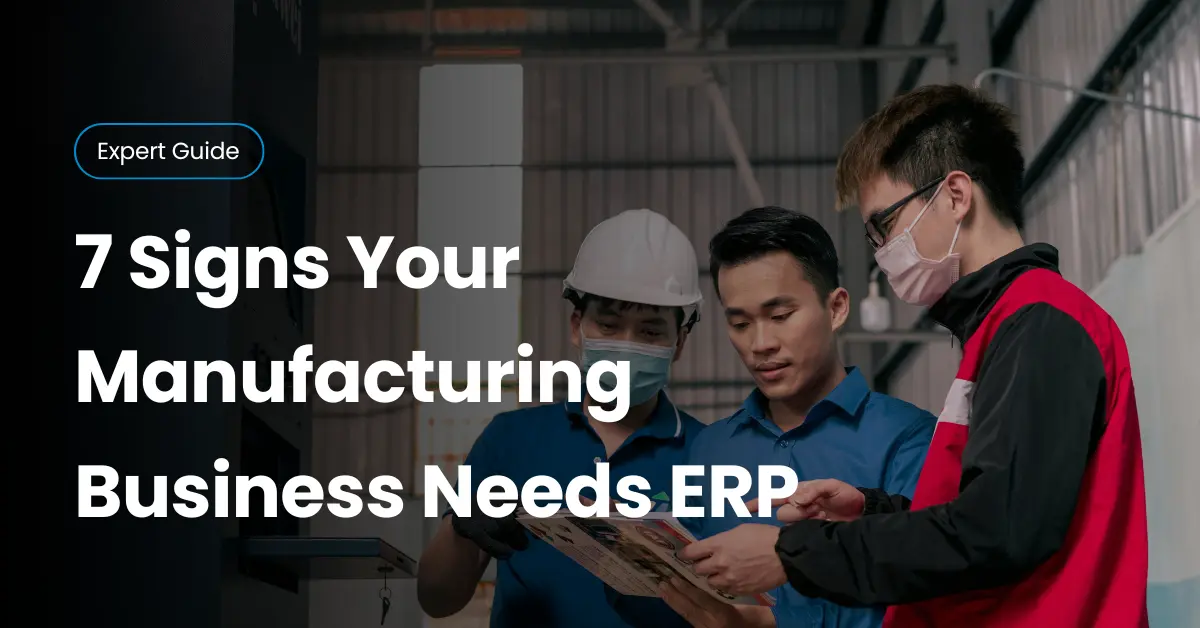Picture this: your production manager walks into Monday already behind. Spreadsheets won’t reconcile. Delivery dates have slipped. And a “quick” meeting to align data across departments eats up three hours before lunch. By the time you think you’ve got clarity, another customer email lands asking why their order hasn’t shipped.
If this sounds familiar, you’re not alone. Many manufacturers fight the same fires every day, mistaking them for isolated problems when they’re actually systemic warning signs. The truth? These are signs that your business needs manufacturing ERP software to function with clarity and control.
Infintrix, as manufacturing ERP specialists who’ve seen these patterns hundreds of times, we can tell you: small inefficiencies grow into expensive mistakes. Let’s walk through seven warning signs that show when it’s time to consider a manufacturing ERP software—and why ignoring them costs more than you think.
1. Your Team Wastes Hours Reconciling Data Between Systems
Every manufacturer has seen this movie. Accounting uses one system, operations another, and sales another still. None of them talk. The result? Endless hours spent re-entering the same numbers just to keep things “aligned.”
Symptoms to watch for:
- Manual data entry across multiple platforms
- Disconnected systems requiring reconciliation meetings
- Version control nightmares with three different “final” spreadsheets
When your manufacturing ERP system isn’t integrated, you’re not just burning time—you’re burning morale. People want to solve problems, not babysit data.
The Real Cost: More Than Just Wasted Time
What looks like simple duplication actually eats at decision-making speed. Delays creep in. Employees get frustrated. And instead of analyzing data to guide growth, your team spends hours just cleaning it. That’s opportunity cost you can’t see—but definitely feel.
2. You Can’t Get Real-Time Visibility Into Production Status
Check your shop floor right now. Do you know where every job stands? Can you trust that data? Without real-time tracking, production managers are forced to walk the floor with clipboards or call supervisors for updates. By the time they get answers, the situation’s already changed.
Lack of production visibility means you can’t promise delivery dates with confidence. Customers notice. Expedited shipping becomes the norm, not the exception. And fire-fighting mode becomes your daily operating standard.
“Where’s My Order?” Becomes a Daily Crisis
Sales teams without shop floor monitoring are left scrambling when customers ask for status updates. Instead of instant answers, they’re chasing emails, making calls, and hoping for the best. It’s not just embarrassing—it chips away at customer trust with every missed commitment.
3. Inventory Counts Never Match Reality (And It’s Costing You)
If cycle counts feel like a guessing game, you’re paying for it in more ways than one. Stock discrepancies mean you think you have material that isn’t there—or worse, you order extra you didn’t need. Both drive up carrying costs while slowing down production.
We’ve seen businesses lose thousands per month because inaccurate inventory led to last-minute supplier orders, rush shipping, or production halts. A modern ERP solution gives you inventory accuracy by tying counts directly to transactions, not memory or manual logs.
The Domino Effect of Inaccurate Inventory
One wrong count can delay an entire production run. That delay triggers expedited orders, overnight freight, and late deliveries. The result? Higher costs, lower margins, and disappointed customers who start looking elsewhere.
4. You’re Flying Blind on Profitability and Job Costs
Can you tell—right now—which jobs make money and which quietly drain your margins? Many manufacturers can’t. Without an ERP system, job costing becomes educated guesswork. Material costs shift, labor hours go untracked, and overhead disappears into a spreadsheet no one trusts.
If you don’t know true profit margins by product, customer, or job, you’re steering blind. That’s not just a financial reporting gap—it’s a growth barrier, because you can’t double down on what’s working or cut what isn’t.
5. Critical Business Knowledge Lives in One Person’s Head
Every company has a “go-to” expert. Jane in production knows which supplier ships fastest. Mark in accounting understands the quirks of your biggest customer’s billing. But here’s the problem: if that person leaves, everything grinds to a halt.
Institutional knowledge is valuable, but it’s fragile. Without documented processes or a unified ERP solution, your business continuity depends on whether that one person answers their phone. That’s not strategy—it’s risk.
When Your Expert Becomes Your Single Point of Failure
Onboarding takes months because only Jane knows the workflow. A customer issue escalates because only Mark remembers the manual workaround. When experts become gatekeepers of tribal knowledge, your company inherits their limitations along with their skills.
6. Compliance and Traceability Challenges Keep You Up at Night
Auditors don’t care how busy you are. Regulators don’t care how many spreadsheets you’re juggling. If you can’t produce an audit trail that shows lot tracking from supplier to customer, you’re exposed.
For manufacturers, compliance requirements aren’t optional—they’re survival. Without traceability, recalls turn into full-blown crises. Without automated reporting, every audit feels like a scramble. A manufacturing ERP system makes traceability part of your daily workflow, not a fire drill once a year.
7. You’re Turning Away Growth Opportunities Because You Can’t Scale
Imagine landing a major contract—but turning it down because your current system can’t handle the volume. It happens more often than you think. Businesses that rely on manual processes hit a ceiling: they can’t open a second shift, manage a new location, or integrate an acquisition.
Scalability isn’t about working harder; it’s about systems that flex with your growth. When your ERP solution handles capacity planning, reporting, and supply chain coordination, growth stops being a burden and starts being a strategy.
The “We’re Too Busy to Implement” Trap
Many leaders put off ERP because “we don’t have time.” Ironically, that’s the biggest sign you need it. You’re too busy because of inefficiency. Waiting just makes the problem compound—costs rise, morale drops, and growth slips through your fingers.
Get Connected with the Best Manufacturing ERP Solution Provider:
These days, when every manufacturing business wants to grow. And struggle in finding the right ERP partner to implement an all-in-one manufacturing ERP system to manage their business workflows smoothly and effectively without facing any problems. Then, Infintrix ERP Solution is the best vendor choice for your growing manufacturing business. Get in touch with our ERP experts and scale your business with our ERP solution.
Conclusion: Recognizing the Signs Before It’s Too Late
If you nodded along to three or more of these signs, it’s not bad luck—it’s a system problem. Businesses that ignore the warning signs end up trapped in firefighting mode, reacting instead of steering.
The good news: manufacturing ERP software isn’t about adding complexity; it’s about removing it. A modern ERP solution gives manufacturers visibility, control, and scalability so growth feels like an opportunity again—not a threat.
As manufacturing ERP specialists, Infintirx has helped companies move from spreadsheets and silos to clarity and control with a simple discovery process. If you’re ready to stop patching problems and start scaling with confidence, it might be time to explore the right manufacturing ERP system for your business.
FAQ: Manufacturing ERP Software
Q1. What is manufacturing ERP software?
Manufacturing ERP software is an integrated system that connects production, inventory, accounting, and supply chain into one platform, giving manufacturers real-time visibility and control.
Q2. How do I know my business needs ERP?
Common signs include inaccurate inventory, manual data entry between systems, missed delivery dates, and no clear view of job costs or profitability.
Q3. Is cloud ERP better than on-premise for manufacturers?
Cloud ERP offers flexibility, remote access, and easier updates, while on-premise may suit companies needing full control over local infrastructure.
Q4. How does ERP improve inventory accuracy?
ERP links every material transaction directly to your database, reducing stock discrepancies, cutting carrying costs, and improving order fulfillment.
Q5. Can small manufacturers benefit from ERP systems?
Yes—modern ERP solutions scale down as well as up, making them effective for small shops struggling with growth, compliance, or process bottlenecks.

